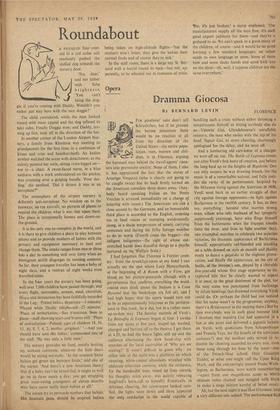Roundabout
A PIGTAILED four-year- old in a red sailor suit resolutely pushed the stuffed dog towards the nursery door.
'No, dear,' said her father with false brightness, The child considered, while the man looked round with mute appeal and the dog refused to take sides. Finally Doggie won; and Daddy, rev- ving up fast, took off in the direction of the bar.
In another corner of the London Airport Nur- sery, a family from Rhodesia was meeting its grandparents for the first time,•in a confusion of kisses and cries and handkerchiefs. An Indian mother watched the scene with detachment, as she calmly painted her nails, sitting cross-legged on— not in—a chair. A sweet-faced nurse, in a blue uniform with a stork embroidered on the pocket, was crooning over a gulping bundle. 'Poor dar- ling.' she soothed. 'Did it dream it was in an aeroplane?'
The atmosphere of the airport nursery is definitely anti-aeroplane. No window on to the runways; no toy aircraft; no pictures of planes to remind the ,children what it was that upset them. The place is intentionally homey and down-on- the-ground.
It is the only one so complete in the world, and it is there to give children a place to play between planes and to provide mothers of babies with the 'privacy and equipment necessary to feed and change them. The intake ranges from two or three tots a day to something well over forty, when an immigrant airlift disgorges its teeming contents. So far, their youngest traveller has been a baby a eight days, and a veteran of eight weeks even travelled alone.
'In the four years the nursery has been going, well over 7,000 children have passed through; and every flight, nationality, scream, meal, excretion, ilIlleSS and destination has been faithfully recorded in the Log: 'Potted befo i. departure-5 minutes.' 'Played while Daddy telephoned-25 minutes.' 'Place of embarkatioh—San Francisco. Seen to plane—staff showing scars and bruises still.' Place of embarkation—Poland; ages of children 18, 16, 12, I0,' 8, 5, 4, 2; mothei pregnant."—And you should have seen the father; Commented one•of the staff. 'He was only a little man.'
The nursery provides no food, merely heating up, without comment, whatever the little dears would be eating normally. 'At the moment 'Swiss babies get green tea between feeds,' said one of the nurses. 'And there's a new American theory that if a baby can't be breast-fed, it might as well go on to three meals a day; you get strapping great meat-eating youngsters of eleven months who have never really been babies at all.'
The nurses try to persuade mothers that babies, like fountain pens, should be emptied before 'being taken on high-altitude flights—'but the mothers won't listen; they give the babies their normal feeds and of course they're sick.'
In the staff room, there is a large toy St. Ber- nard with a barrel round its neck—but not, ap- parently, to be wheeled out in moments of crisis. 'No, it's just broken,' a nurse explained. 'The manufacturers supply all the toys free, it's such good export publicity for them—and they're a godsend to us. We can't speak to a good many of the children, of course—and it would be no good learning a few standard languages; an infant needs its own language or none. Some of them bow and some shake hands and some kick you on the shins—oh, well, I suppose children are the same everywhere.'














































 Previous page
Previous page